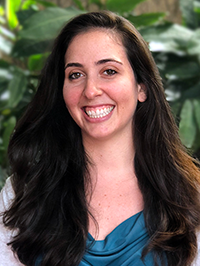IRIS & the Next Generation: Supporting Classrooms

In the IRIS Story “IRIS in the Sunshine State: Use in College Courses and Sharing with Colleagues,” Dr. Mary Little, special education faculty member at the University of Central Florida (UCF), explained how she introduces her teacher candidates to the free resources available from OSEP-funded centers, including the IRIS Center. Two of her students, one former and one current, share their stories here and talk about how they use IRIS resources to support their work in schools.
IRIS Use in the Schools: Supporting Teachers
An autism spectrum disorder program support representative for Florida’s Duval County Public School system, Jeffrey Sharrah originally learned about the IRIS resources during his master’s program at UCF when he completed assignments using IRIS Modules on Universal Design for Learning (UDL) and peer-assisted learning strategies (PALS). Jeffrey was impressed with the instructional design of the modules and the formats through which the in-depth content was provided: text, graphics, audio interviews, video clips, and interactive activities. He realized that, consistent with UDL, the resources modeled the multiple means that teachers should use to instruct their students.

In his interview, Jeffrey shares the many ways that he now uses IRIS resources, including to help new teachers gain critical skills and to support those teachers who might need a little extra help (time: 3:32)
Jeffrey Sharrah
ASD Instructional Program Support Representative
Duval County Public Schools, Florida
Just having used this whenever I was a student helped to expand my knowledge. When you read through stuff, the visual models that go along with it were really helpful for me. It pulled together a lot of information. And then once I actually started getting into the resources a little farther, all the other things that are included, like the activities, the information briefs, I found to be really interesting, and I’m still using them today even after I’m done with the classes. It’s a really good base to come back to whenever I need to find information to help train my teachers.
In my role in the district, I support teachers that are in a special autism-related program. Once I started looking into IRIS, I found other modules about functional behavioral assessments, classroom management, as well as other areas like differentiated instruction. With a new teacher coming in, they have a difficult time with classroom management, especially when you’re working with students that often times display behavior issues. So classroom setup was a big thing, and that was a part of the IRIS resources. So I used that, and I sat down and developed a training with the coach that was at the school and went through it with the new teacher. We developed a plan so I could follow up with her and continue following through on that aspect and make sure she was implementing certain things at different times.
There was another time with a more experienced teacher that was having difficulty getting specific strategies in place in his classroom and working with inclusion students. So we actually worked with the gen ed teachers and the administration in that instance, because we wanted to increase the student’s independent functioning skills and then get him to be able to go out into the gen ed classrooms. So we worked with the administration and sort of changed the school environment, as well as increasing his independent skills, and we found all that information within the IRIS Center Modules.
The IRIS Modules have come in very handy, because at the beginning of the school year we have to do specific trainings for our self-contained teachers, as well as the support staff like paraprofessionals. So I worked with some of my colleagues. We found that some of the tools included in the IRIS Modules and some of the lessons were helpful to do during preplanning trainings. Now we’re following up. We have early release days every other week, and those are two-hour trainings so we can fit specific module trainings into that framework.
We have quality performance indicators, a list of research-based standards that we try to ensure that every self-contained classroom has in place and is using on a consistent basis. Whenever our coaches directly support the teachers in the self-contained classrooms, they’ll go through on a quarterly basis and talk about these performance indicators and what’s in place and coach them on how to get those things in place. A lot of times, the teachers had trouble implementing all of those performance standards, but after showing them the modules and other resources I’ve noticed that the amount and the quality of the performance indicators that can be seen in the classrooms have increased.
IRIS Abroad: The Dominican Republic
A student of Dr. Little’s in UCF’s distance-learning program, Rebecca Ziberstein is currently working as a 5th- and 6th-grade science teacher in the Dominican Republic. Her students have a wide range of needs, and many are just beginning to learn English. Since her initial introduction to IRIS resources, Rebecca has found creative ways to use them on her own. According to Rebecca the IRIS resources are invaluable to her for two reasons. One is that there are not a lot of easily accessible resources about students with special needs in the Dominican Republic. The second reason is that she is developing her own portfolio of resources for use after she graduates. Rebecca cites IRIS resources as helping her to gain a better understanding of specific instructional techniques and practices that are evidence-based and then actively using those practices to change the way she teaches her students.

In her interview, Rebecca shares the resources that she currently finds most helpful, and explains how she plans to use others in the future (time: 2:25)
Rebecca Ziberstein
Classroom teacher
The Dominican Republic
I’ve been using the IRIS Center in all of my university classes. We’ve used them as another resource for learning in addition to our textbook. I found them extremely helpful, and I’ve gone back and relooked at them and saved links that are embedded within the modules. I remember one where you can check to see a student-graphing record, student data, and practicing how to do that. And it tells you whether you’re doing it right and doing it wrong. Give me feedback right there. I really enjoyed those in particular, as well as the ones that have step-by-step instructions of “First, look for this and then look for this and then you can move on to this step.”
I’ve used modules about accommodations. The last two years I was teaching math, I referenced the math modules a lot and differentiation modules because I had a huge gap in my class between my lowest students and my high students, so I was able to use those repeatedly, kind of go back to it and remind myself.
I plan to use the IRIS Modules in the future, when I’m done with my classes, while I’m teaching. I’ve created a resource for my school, for other teachers at my school, because we don’t have a special education department or anyone who provides resources. So I’ve started making a document that has specific links, specific modules from IRIS and other resources for teachers to use and it’s divided by grade level and subject. I’ve shared it with my school, teachers that I work closely with. And I hope to in the future help develop a special education department within my school. And I plan to use these resources and share them with others so they can see them, use them, and have them, because they’re so valuable.
Since I’ve been using the IRIS resources, I definitely feel like I have a better understanding of how to act in my class because the resources—the modules, and the videos, and the practices—give a complete idea of how things can work in the class and based on evidence what the best way to go about doing certain processes or activities would be. I feel like I’ve been able to see a change in my classes following the steps that are shown in these modules.